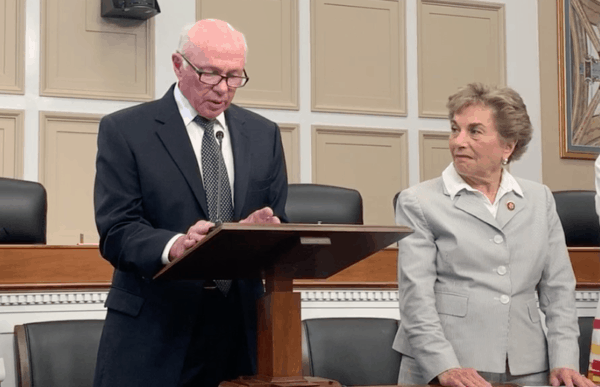
Seniors depend on drugs derived from living organisms – known as ‘biologics’ – to treat a plethora of serious health conditions, including multiple sclerosis, Crohn’s disease, asthma, rheumatoid arthritis, chronic pain and cancer. But for many older Americans, biologics are simply out of reach because they cost too must. Today, Rep. Jan Schakowsky (D-IL) and four other members of Congress are introducing legislation to cut those prices by curtailing anti-competitive behavior among biologics makers.
The PRICED Act limits of “one of Big Pharma’s most effective price gouging tools” by reducing the period during which drug companies have exclusive marketing rights for biologics. The legislation would cut the exclusivity period from the current twelve years to five. Such a change could save Medicare upwards of $7 billion over ten years.
National Committee President Max Richtman joined Rep. Schakowsky, Rep. Rosa DeLauro (D-CT), Rep. Angie Craig (D-MN), Rep. Lloyd Doggett (D-TX), and Rep. Raja Krishnamoorthi (D-IL), at a press conference today to endorse the PRICED Act.
“This legislation is a fair compromise for the manufacturers, and a fair deal for consumers since, once that 5-year limit is reached, generic manufacturers can develop biosimilar drugs at a much lower cost for patients.” – National Committee President Max Richtman, 6/20/19
Biologics account for roughly 2% of prescriptions but a whopping 38% of drug spending. Virtually all the top 10 Medicare Part B drugs are biologics, which indicates how much seniors rely on these medications. Drug-makers have been hiking prices for biologics every year, often in lockstep with each other. In January, Big Pharma jacked up the cost of each of these biologics, which treat everything from rheumatoid arthritis to heart failure:
2019 Price Increases
Enbrel +6.2%
Entresto + 9.9%
Humira +6.2%
Humira currently retails for $40,000/year – up from $19,000 in 2012. Fortunately, Medicare Part D beneficiaries do not have to pay the entire cost of these drugs, but are responsible for copays and deductibles that can quickly become unmanageable. This presents seniors with a cruel choice between taking life-saving medications or paying bills like rent and groceries. Legislation such as the PRICED Act would increase competition and exert downward pressure on the price of biologics for seniors and patients of all ages.

National Committee president Max Richtman endorses Rep. Jan Schakowsky’s PRICED Act
The PRICED Act is part of a broader effort in the House to take serious action on prescription drug prices by cracking down on Big Pharma’s anti-competitive practices. Price transparency and the ability to re-import drugs from other countries are also key. But, as we wrote last week, the most powerful method for reducing costs is allowing Medicare to negotiate prices directly with pharmaceutical companies, as the Veterans Administration already does.
“These are smart, strategic approaches to lowering drug costs that we have been fighting to achieve in the Medicare program since the passage of the Medicare Modernization Act of 2003,” says Richtman. “It’s past time for Congress to show Big Pharma that patients must always come before profits.”


